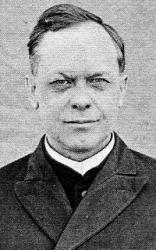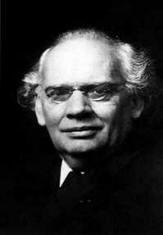Planning worship?
Check out our sister site, ZeteoSearch.org,
for 20+ additional resources related to your search.
- |
User Links
Person Results
Martin H. Franzmann
1907 - 1976 Person Name: Martin H. Franzmann, 1907-1976 Scripture: 1 Corinthians 5:6-8 Author of "Our Paschal Lamb, That Sets Us Free" in With One Voice Born: January 29, 1907, Lake City, Minnesota.
Died: March 28, 1976, Cambridge, England.
Martin H. Franzmann
C. W. Naylor

1874 - 1950 Person Name: Charles W. Naylor Scripture: 1 Corinthians 5:7 Author of "Christ Our Sacrifice" in Timeless Truths Naylor, Charles Wesley. (1874--1950). C. W. Naylor was born in southern Ohio and reared in Ohio and West Virginia by grandparents. At the age of nineteen he left the Methodist church for the Church of God. He worked for a while at the Gospel Trumpet Company in Grand Junction, Michigan and on some evangelistic tours. He was ordained in 1899 in Springfield, Ohio. He was first injured in 1908 in Florida while moving timbers from under a meeting tent. He suffered a dislocated kidney and other internal injuries. A year later he was in a bus accident that left him an invalid for the rest of his life.
Naylor wrote eight books, many articles and pamphlets, many hymns and gospel songs, besides being a columnist in the Gospel Trumpet.
--John W.V. Smith, DNAH Archives
See also: Neidert, David L. (1985). Reformation's Song: A History of Church of God Music. Anderson, Ind.: the author.
C. W. Naylor
Barney Elliott Warren

1867 - 1951 Person Name: Barney E. Warren Scripture: 1 Corinthians 5:7 Composer of "[Down from the portals of glory]" in Timeless Truths Barney Elliott Warren was an American Christian hymnwriter and minister.
See more in Wikipedia
Barney Elliott Warren
Ralph Vaughan Williams

1872 - 1958 Person Name: Ralph Vaughan William (1872-1958) Scripture: 1 Corinthians 5:7-8 Composer of "SINE NOMINE" in Wonder, Love, and Praise Through his composing, conducting, collecting, editing, and teaching, Ralph Vaughan Williams (b. Down Ampney, Gloucestershire, England, October 12, 1872; d. Westminster, London, England, August 26, 1958) became the chief figure in the realm of English music and church music in the first half of the twentieth century. His education included instruction at the Royal College of Music in London and Trinity College, Cambridge, as well as additional studies in Berlin and Paris. During World War I he served in the army medical corps in France. Vaughan Williams taught music at the Royal College of Music (1920-1940), conducted the Bach Choir in London (1920-1927), and directed the Leith Hill Music Festival in Dorking (1905-1953). A major influence in his life was the English folk song. A knowledgeable collector of folk songs, he was also a member of the Folksong Society and a supporter of the English Folk Dance Society. Vaughan Williams wrote various articles and books, including National Music (1935), and composed numerous arrangements of folk songs; many of his compositions show the impact of folk rhythms and melodic modes. His original compositions cover nearly all musical genres, from orchestral symphonies and concertos to choral works, from songs to operas, and from chamber music to music for films. Vaughan Williams's church music includes anthems; choral-orchestral works, such as Magnificat (1932), Dona Nobis Pacem (1936), and Hodie (1953); and hymn tune settings for organ. But most important to the history of hymnody, he was music editor of the most influential British hymnal at the beginning of the twentieth century, The English Hymnal (1906), and coeditor (with Martin Shaw) of Songs of Praise (1925, 1931) and the Oxford Book of Carols (1928).
Bert Polman
Ralph Vaughan Williams
Henry J. Gauntlett

1805 - 1876 Person Name: H. J. Gauntlett, 1805-1876 Scripture: 1 Corinthians 5:7-8 Composer of "ST ALBINUS" in Common Praise Henry J. Gauntlett (b. Wellington, Shropshire, July 9, 1805; d. London, England, February 21, 1876) When he was nine years old, Henry John Gauntlett (b. Wellington, Shropshire, England, 1805; d. Kensington, London, England, 1876) became organist at his father's church in Olney, Buckinghamshire. At his father's insistence he studied law, practicing it until 1844, after which he chose to devote the rest of his life to music. He was an organist in various churches in the London area and became an important figure in the history of British pipe organs. A designer of organs for William Hill's company, Gauntlett extended the organ pedal range and in 1851 took out a patent on electric action for organs. Felix Mendelssohn chose him to play the organ part at the first performance of Elijah in Birmingham, England, in 1846. Gauntlett is said to have composed some ten thousand hymn tunes, most of which have been forgotten. Also a supporter of the use of plainchant in the church, Gauntlett published the Gregorian Hymnal of Matins and Evensong (1844).
Bert Polman
Henry J. Gauntlett
Julius Röntgen

1855 - 1932 Person Name: J. Röntgen (1855-1932) Scripture: 1 Corinthians 5:7 Arranger of "IN BABILONE" in Rejoice in the Lord An important Dutch pianist, composer, conductor, scholar, and editor, Julius Rontgen (b. Leipzig, Germany, 1855; d. Utrecht, the Netherlands, 1932) studied music in Leipzig with well-known German teachers. In 1877 he moved to Amsterdam, where he first taught at the Amsterdam Conservatory. In 1886 he became conductor of the Society for the Advancement of Musical Art. He returned to the Conservatory as director in 1918, and then retired in 1924 to devote himself to composition. He was a friend of leading composers of his day, including Liszt, Brahms, and Grieg, and wrote a biography of Grieg. Rontgen's compositions include symphonies, chamber works, operas, and film scores.
Bert Polman
Julius Röntgen
David Clark Isele
Scripture: 1 Corinthians 5:7 Composer of "[Lamb of God, you take away the sin of the world]" in Catholic Book of Worship III
David Clark Isele
William Henry Monk

1823 - 1889 Person Name: William Henry Monk (1823-1889) Scripture: 1 Corinthians 5:6-8 Adapter and Harmonizer of "WÜRTEMBURG (STRAF MICH NICHT)" in Common Praise (1998) William H. Monk (b. Brompton, London, England, 1823; d. London, 1889) is best known for his music editing of Hymns Ancient and Modern (1861, 1868; 1875, and 1889 editions). He also adapted music from plainsong and added accompaniments for Introits for Use Throughout the Year, a book issued with that famous hymnal. Beginning in his teenage years, Monk held a number of musical positions. He became choirmaster at King's College in London in 1847 and was organist and choirmaster at St. Matthias, Stoke Newington, from 1852 to 1889, where he was influenced by the Oxford Movement. At St. Matthias, Monk also began daily choral services with the choir leading the congregation in music chosen according to the church year, including psalms chanted to plainsong. He composed over fifty hymn tunes and edited The Scottish Hymnal (1872 edition) and Wordsworth's Hymns for the Holy Year (1862) as well as the periodical Parish Choir (1840-1851).
Bert Polman
William Henry Monk


 My Starred Hymns
My Starred Hymns


